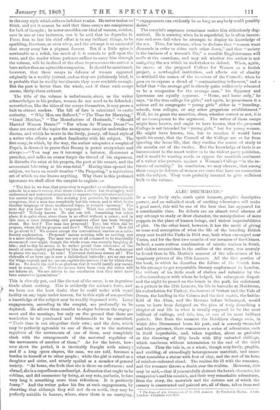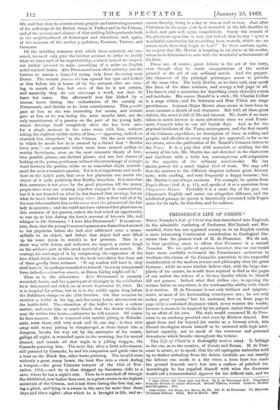ALEC DRUMMOND. 4 ' IF a very lively style, much quiet humour,
graphic descriptive powers, and an unlimited stock of exciting adventures will make a good novel, this will be one of the best that has appeared for a considerable time. Its defects are an almost total absence of any attempt to study or draw character, the manipulation of mere puppets in the place of human beings, and violent improbabilities of plot. On the other hand, however, it has the merit of giving us some real conception of what the life of the invading British army sent to aid the Turks in 1854 was, both when encamped near Varna, and for the first two months of our invasion of the Crimea. Indeed, a more curious combination of minute realism in detail, and violent romanticism in the outline of the story, can scarcely be found than in Mr. Martin's account of the adventures of his imaginary private of the 17th Lancers. All the first portion of the book, in which he describes the failure of his Scotch hero in his attempt to get respectable literary employment in Loudon, the robbery of his little stock of clothes and valuables by the coffee-housekeeper with whom he lodged, his subsequent despair and the night he passed on the bench in the park, his enlistment as a private in the 17th Lancers, his life in barracks at Maidstone, his embarkation for Turkey, the horrors of Scutari and the Vale of Devno, the landing in the Crimea and the first march, the battlefield of the Alma, and the bivouac before Sebastopol, would seem to have been designed on the plan of batty describing a chapter of real life in what is usually supposed to be the most brilliant of callings, and this, too, at one of its most brilliant periods. But from the moment the Balaklava charge ends, in which Alec Drummond bears his part, and is severely 'wounded and taken prisoner, there commences a series of adventures, each in itself improbable, and, taken together, about as probable as the throwing of fifty heads with fifty unloaded shillings, which continues without intermission to the end of the third volume. Thus the tale is, as a whole, though very lively, graphic, and exciting, of exceedingly heterogeneous materials, and somewhat resembles a statue with feet of clay, and the rest of its form of rainbow-coloured cloud. The realism fits ill with the romance, and the romance throws a doubt over the realism. However, this may be said,—that if you carefully abstract the hero's character, his companion's and his cousin's, and their very remarkable adventures, from the story, the materials and the colours out of which the scenery is constructed and painted are, all of them, taken from real
life, and that they do contain avery graphic and interesting account of the sufferings of the British Army in Turkey and in the Crimea, and of the scenery and climate of that striking little peninsula both in the neighbourhood of Sebastopol and elsewhere, and, again, of the manners of the motley population, Russians, Tartars, and Germans.
Of the startling romance with which these materials are seasoned, we need only give the briefest account in order to justify
what we have said of its improbability,—which indeed we suspect our author intended to make something of a satire on English novel-readers' tastes. Alec Drummond soon after enlisting, has the fortune to rescue a beautiful young lady from drowning near
Dover. The recruit fancies she has opened her eyes and looked at him before she is borne off by the servants who are com
ing in search of her, but even of this he is not certain, and assuredly they do not exchange a word, nor does he learn her name. She afterwards sees him kicked by a
vicious horse during the embarkation of the cavalry at Portsmouth, and shrieks as he loses consciousness. This possible gaze at him as she was recovering her senses, and certain gaze at him as he was losing his, some months later, are the only nourishment of a passion on the part of the young lady, which develops itself completely after she has been once for a single moment in the same room with him, without taking the slightest visible notice of him,—" appearing, indeed, to overlook him altogether," in the Crimea. On the next occasion in which he meets her he is assured by a friend that " Bertha loves you,"—an assurance which must have seemed sudden to worthy Scotchmen, even on the most romantic theory of love. One possible glance, one distinct glance, and one lost chance of looking at the young gentleman without the interchange of a single word between the parties, strike us as somewhat slight nourishment for even a romantic passion. Yet it is so impetuous and confident on the lady's part, that even her physician can assure the object of it quite positively that Bertha loves him. It is true that that assurance is not given by the good physician till the young people have been one evening together engaged in conversation, but it is not founded on what he has learned that evening, but on what he knew before this meeting, since Alec is first told of it by the man who conducts bim to his room from the presence of the fair lady in question ; and she could not have informed her physician on this occasion of her passion unless she had seized an opportunity to run up to him during the hero's account of his own life, and whisper to Dr. Schwartz, " I love Alec Drummond." It seems certain, then, that the young Countess's passion was formed and avowed to her physician before she had ever addressed even a monosyllable to its object, and before that object had ever lifted up his voice (even to shriek) in her presence. This is a short way with lovers, and indicates, we suspect, a covert laugh on the author's part at this stock material of modern novels. He conveys his contempt of it by compressing the expression of the love which lends its romance to the book into about five lines out of these goodly three volumes. If my readers will have it, they shall have it,' he perhaps remarked to himself, in a very compressed form indeed,—extractum amoris, as Baron Liebig might call it.'
Then as to the adventures. Alec Drummond is severely wounded, faints, and lies a good part of the night in the cold before he is discovered and aided, on or about September 25, 1854. He is in hospital for a time, but he is in the saddle again long before the Balaklava charge on the 25th October. On that occasion he receives a bullet in the leg, and lies many hours unconscious on the battle-field. The extraction of the bullet is such a serious matter, and costs him so much blood, that the doctor thinks he may die within two hours,—otherwise he will recover. Of course he does recover. He is removed with terrible jolting to Bakschiserai, rests there, still very weak and ill, one day ; is then sent away with worse jolting to Simpheropol, is there thrust into a dungeon, breaks his way out by the assistance of his cousin, gallops all night, is wounded again in the morning, has his wound dressed, and travels all that night in a jolting waggon, the Cossacks pursuing him. The next day, after a little refreshment, still pursued by Cossacks, he and his companion and guide take to a boat on the Black Sea, other boats pursuing. The invalid rows violently a great many hours, the boat flies into a creek during a tempest,—the great Crimean tempest of the 14th of November, 1854,—and he is then dragged up limestone cliffs to a cave, where he has a night's rest. Then he is marched off through the whirlwind, now higher than ever, to a great cavern in the highest mountain of the Crimea, and is lost there during the first day, seeing a ghost, and lying in a swoon in the cave for more than three days and three nights ; after which he is brought to life, and re covers directly, being in a day or two as well as ever. Just after Christmas in the same year be is wounded in the left shoulder in a duel, and gets well again immediately. Surely the remark of the physician upon him is very just indeed, that he has "quite a wonderful constitution for recovering from wounds, which are no sooner made than they begin to heal !" In these matters, again, we suspect that Mr. Martin is laughing in his sleeve at his reader, whom he is determined to sate with the wonderful achievements of his hero.
These are, of course, great defects in the art of the story, even though they be ironic exaggerations of the author pointed at the art of our ordinary novels. And the puppetlike character of the principal personages seems to partake of the same idea. The Lady Bertha, as we have said, may speak five lines of the three volumes, and occupy a full page in all. The hero is only a sensorium for describing (very cleverly) scenes and incidents. His cousin Donald is a stick ; Dr. Charles Collier is a stage villain ; and Dr. Schwartz and Herr Ulrich are stage providences. Serjeant-Major Brown alone seems to have been in some measure a sketch of real character. But with all these great defects, the novel is full of life and interest. We doubt if we have taken so much interest in mere adventure since we read Fennimore Cooper's tales in our old boyish days. And as for the physical incidents of the Varna encampment, and the first month of the Crimean expedition, no description of them so telling and graphic and effective in every way has yet appeared, as far as we are aware, since the publication of Dr. Russell's Crimean letters to the Times. It is a pity that with materials so striking for the scenery of his tale, Mr. Martin has not sketched in the characters and incidents with a little less contemptuous self-adaptation to the appetite of the ordinary novel-reader. He has shown powers for a much higher kind of work. We may add that the mottoes to the different chapters indicate great literary taste, wide reading, and very frequently a happy humour ; but Mr. Martin is not always accurate. For example, he quotes from Pope's Homer (vol. ii. p. 41), and speaks of it as a quotation from Chapman's Homer. Probably it is a mere slip of the pen, but Chapman's English and metre are altogether different, and the celebrated passage he quotes is historically associated with Pope's name for its style, its blunders, and its cadence.



































 Previous page
Previous page